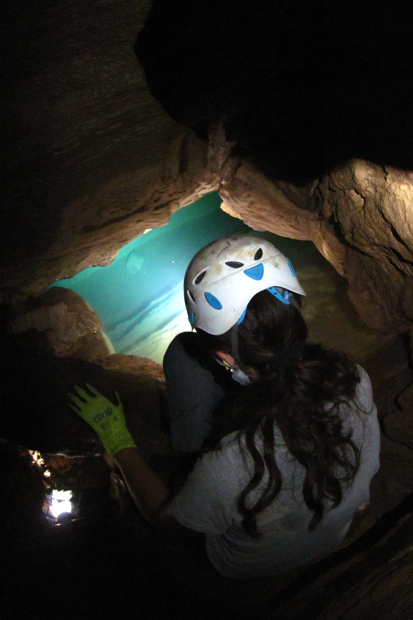
East Central University Undergraduate Lindsey Thompson navigates an underground passage for a look at the Arbuckle-Simpson Aquifer.
Kevin Blackwood / Arbuckle-Karst Conservancy


East Central University Undergraduate Lindsey Thompson navigates an underground passage for a look at the Arbuckle-Simpson Aquifer.
Kevin Blackwood / Arbuckle-Karst Conservancy

Kevin Blackwood / Arbuckle-Karst Conservancy
East Central University Undergraduate Linzi Thompson navigates an underground passage for a look at the Arbuckle-Simpson Aquifer.
The Arbuckle-Simpson Aquifer serves as the primary source of municipal water for Ada, Durant, and a number of small south-central Oklahoma towns.
The aquifer is unique. It’s mainly replenished by rainfall that seeps into the ground. It’s also the only ‘sole source’ aquifer in the state, which means the Arbuckle-Simpson provides more than 50% of the drinking water for the area, and there’s no other viable alternative
As StateImpact has reported, the last decade has seen a big increase in the number of limestone and sand mining operations in the area, and the pit-mining they do displaces a lot of groundwater. Nearby residents say the mining has dried up streams they tap for drinking water, and the Oklahoma Water Resources Board set out to determine how much water is too much to take from the aquifer.
After all these years, The Journal Record‘s M. Scott Carter reports the OWRB will review proposed limits — and possibly adopt them — at a meeting later this month:
The rule is a decade in the making and the end result of collaboration between advocacy groups, Native American tribes and state and federal agencies. It would allow only two-tenths of an acre-foot (about 64,000 gallons of water) per allocation, per year, said OWRB spokesman Brian Vance. Vance said the new rule would help manage the water of the aquifer and improve the Arbuckle-Simpson’s sustainability.
Currently, an unstudied aquifer like the Arbuckle-Simpson has a annual yield limit of more than 600,000 gallons per year, more than ten times what the new rule would allow.
The impact that will have on pit-mining in the area is not yet clear, but aquifer advocacy groups like Citizens for the Protection of the Arbuckle-Simpson Aquifer — and President Amy Ford —are happy with the proposal.
“It’s being done in a holistic approach,” she said. “Everyone involved understand the importance of the aquifer. Everyone had to share. We all understand that having that flow of water is vital to economic growth.”
StateImpact will be at the OWRB meeting on Oct. 23, where the mining industry will no doubt be heavily represented.